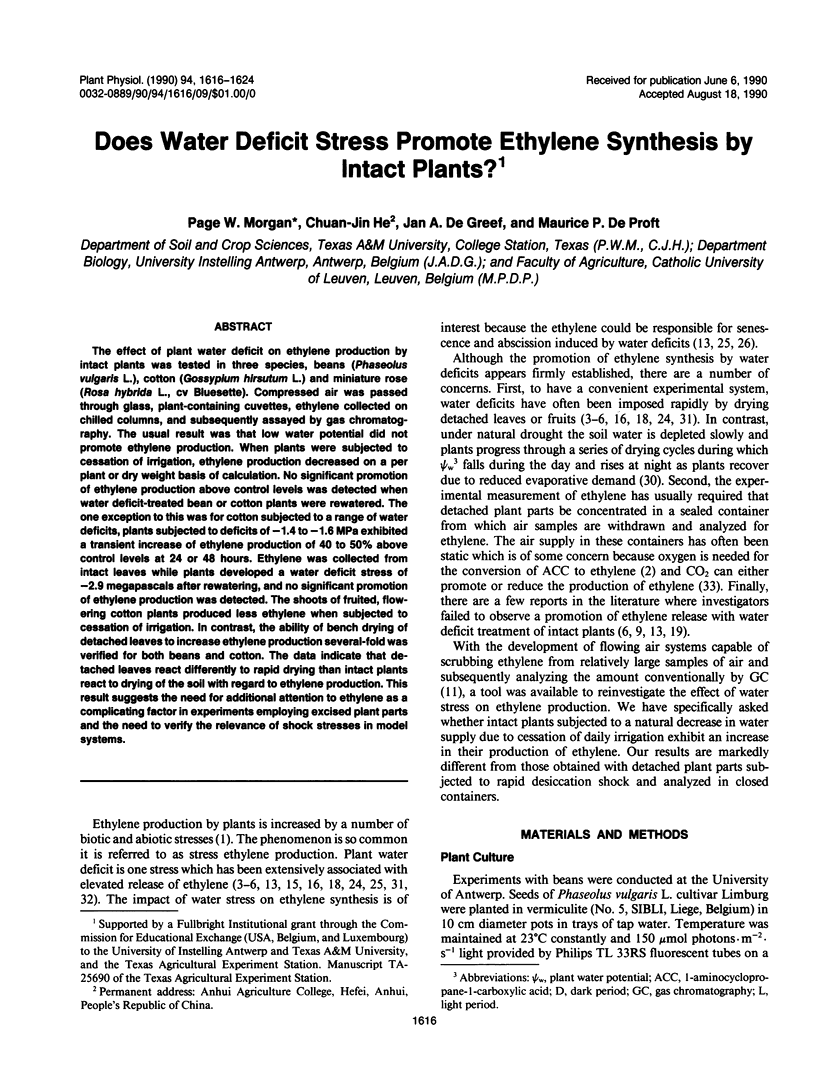Abstract
The effect of plant water deficit on ethylene production by intact plants was tested in three species, beans (Phaseolus vulgaris L.), cotton (Gossypium hirsutum L.) and miniature rose (Rosa hybrida L., cv Bluesette). Compressed air was passed through glass, plant-containing cuvettes, ethylene collected on chilled columns, and subsequently assayed by gas chromatography. The usual result was that low water potential did not promote ethylene production. When plants were subjected to cessation of irrigation, ethylene production decreased on a per plant or dry weight basis of calculation. No significant promotion of ethylene production above control levels was detected when water deficit-treated bean or cotton plants were rewatered. The one exception to this was for cotton subjected to a range of water deficits, plants subjected to deficits of −1.4 to −1.6 MPa exhibited a transient increase of ethylene production of 40 to 50% above control levels at 24 or 48 hours. Ethylene was collected from intact leaves while plants developed a water deficit stress of −2.9 megapascals after rewatering, and no significant promotion of ethylene production was detected. The shoots of fruited, flowering cotton plants produced less ethylene when subjected to cessation of irrigation. In contrast, the ability of bench drying of detached leaves to increase ethylene production several-fold was verified for both beans and cotton. The data indicate that detached leaves react differently to rapid drying than intact plants react to drying of the soil with regard to ethylene production. This result suggests the need for additional attention to ethylene as a complicating factor in experiments employing excised plant parts and the need to verify the relevance of shock stresses in model systems.
Full text
PDF








Selected References
These references are in PubMed. This may not be the complete list of references from this article.
- Adams D. O., Yang S. F. Ethylene biosynthesis: Identification of 1-aminocyclopropane-1-carboxylic acid as an intermediate in the conversion of methionine to ethylene. Proc Natl Acad Sci U S A. 1979 Jan;76(1):170–174. doi: 10.1073/pnas.76.1.170. [DOI] [PMC free article] [PubMed] [Google Scholar]
- Adato I., Gazit S. Water-deficit Stress, Ethylene Production, and Ripening in Avocado Fruits. Plant Physiol. 1974 Jan;53(1):45–46. doi: 10.1104/pp.53.1.45. [DOI] [PMC free article] [PubMed] [Google Scholar]
- Aharoni N. Relationship between Leaf Water Status and Endogenous Ethylene in Detached Leaves. Plant Physiol. 1978 Apr;61(4):658–662. doi: 10.1104/pp.61.4.658. [DOI] [PMC free article] [PubMed] [Google Scholar]
- Apelbaum A., Yang S. F. Biosynthesis of stress ethylene induced by water deficit. Plant Physiol. 1981 Sep;68(3):594–596. doi: 10.1104/pp.68.3.594. [DOI] [PMC free article] [PubMed] [Google Scholar]
- Ben-Yehoshua S., Aloni B. Effect of Water Stress on Ethylene Production by Detached Leaves of Valencia Orange (Citrus sinensis Osbeck). Plant Physiol. 1974 Jun;53(6):863–865. doi: 10.1104/pp.53.6.863. [DOI] [PMC free article] [PubMed] [Google Scholar]
- Beyer E. M., Morgan P. W. Abscission: the role of ethylene modification of auxin transport. Plant Physiol. 1971 Aug;48(2):208–212. doi: 10.1104/pp.48.2.208. [DOI] [PMC free article] [PubMed] [Google Scholar]
- Davenport T. L., Morgan P. W., Jordan W. R. Reduction of auxin transport capacity with age and internal water deficits in cotton petioles. Plant Physiol. 1980 May;65(5):1023–1025. doi: 10.1104/pp.65.5.1023. [DOI] [PMC free article] [PubMed] [Google Scholar]
- Guinn G. Effects of some organic solvents on ethylene evolution from young cotton bolls. Plant Physiol. 1977 Sep;60(3):446–448. doi: 10.1104/pp.60.3.446. [DOI] [PMC free article] [PubMed] [Google Scholar]
- Guinn G. Water deficit and ethylene evolution by young cotton bolls. Plant Physiol. 1976 Mar;57(3):403–405. doi: 10.1104/pp.57.3.403. [DOI] [PMC free article] [PubMed] [Google Scholar]
- Jackson M. B., Osborne D. J. Ethylene, the natural regulator of leaf abscission. Nature. 1970 Mar 14;225(5237):1019–1022. doi: 10.1038/2251019a0. [DOI] [PubMed] [Google Scholar]
- Jordan W. R., Morgan P. W., Davenport T. L. Water Stress Enhances Ethylene-mediated Leaf Abscission in Cotton. Plant Physiol. 1972 Dec;50(6):756–758. doi: 10.1104/pp.50.6.756. [DOI] [PMC free article] [PubMed] [Google Scholar]
- Lipe J. A., Morgan P. W. Ethylene: role in fruit abscission and dehiscence processes. Plant Physiol. 1972 Dec;50(6):759–764. doi: 10.1104/pp.50.6.759. [DOI] [PMC free article] [PubMed] [Google Scholar]
- McMichael B. L., Jordan W. R., Powell R. D. An effect of water stress on ethylene production by intact cotton petioles. Plant Physiol. 1972 Apr;49(4):658–660. doi: 10.1104/pp.49.4.658. [DOI] [PMC free article] [PubMed] [Google Scholar]
- Morgan P. W., Jordan W. R., Davenport T. L., Durham J. I. Abscission responses to moisture stress, auxin transport inhibitors, and ethephon. Plant Physiol. 1977 Apr;59(4):710–712. doi: 10.1104/pp.59.4.710. [DOI] [PMC free article] [PubMed] [Google Scholar]
- Rikin A., Chalutz E., Anderson J. D. Rhythmicity in ethylene production in cotton seedlings. Plant Physiol. 1984 Jun;75(2):493–495. doi: 10.1104/pp.75.2.493. [DOI] [PMC free article] [PubMed] [Google Scholar]
- Twente J. W., Twente J. A. Regulation of hibernating periods by temperature. Proc Natl Acad Sci U S A. 1965 Oct;54(4):1044–1051. [PMC free article] [PubMed] [Google Scholar]


